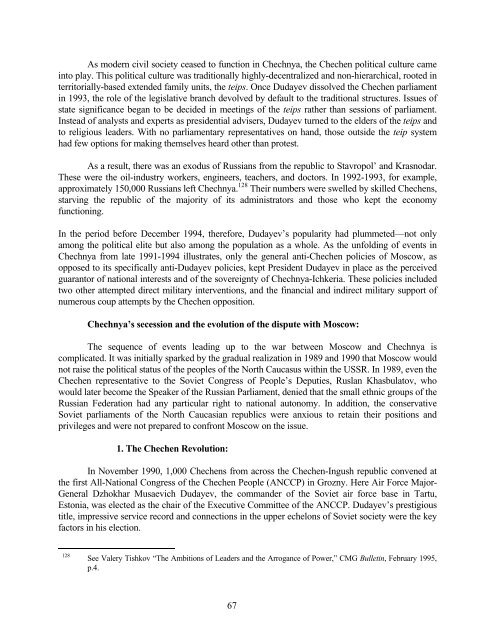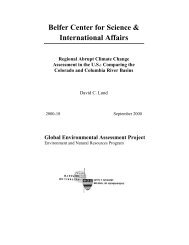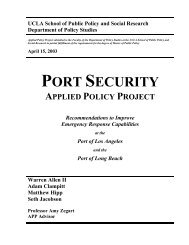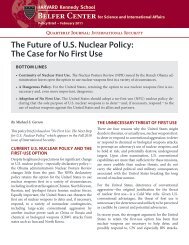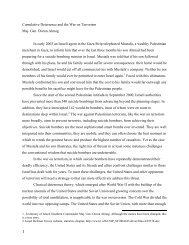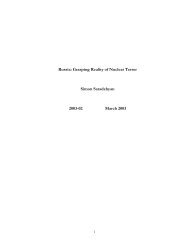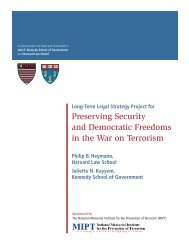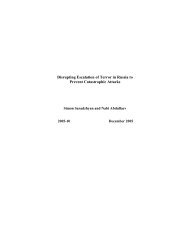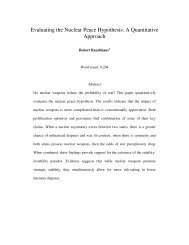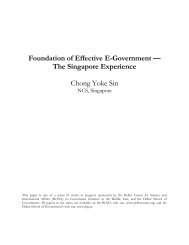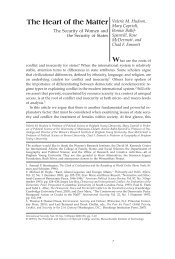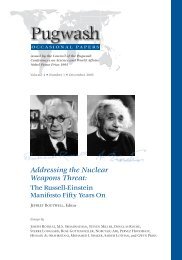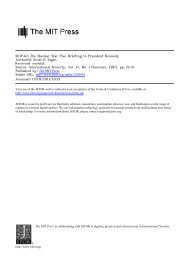RUSSIA'S TINDERBOX - Belfer Center for Science and International ...
RUSSIA'S TINDERBOX - Belfer Center for Science and International ...
RUSSIA'S TINDERBOX - Belfer Center for Science and International ...
You also want an ePaper? Increase the reach of your titles
YUMPU automatically turns print PDFs into web optimized ePapers that Google loves.
As modern civil society ceased to function in Chechnya, the Chechen political culture came<br />
into play. This political culture was traditionally highly-decentralized <strong>and</strong> non-hierarchical, rooted in<br />
territorially-based extended family units, the teips. Once Dudayev dissolved the Chechen parliament<br />
in 1993, the role of the legislative branch devolved by default to the traditional structures. Issues of<br />
state significance began to be decided in meetings of the teips rather than sessions of parliament.<br />
Instead of analysts <strong>and</strong> experts as presidential advisers, Dudayev turned to the elders of the teips <strong>and</strong><br />
to religious leaders. With no parliamentary representatives on h<strong>and</strong>, those outside the teip system<br />
had few options <strong>for</strong> making themselves heard other than protest.<br />
As a result, there was an exodus of Russians from the republic to Stavropol’ <strong>and</strong> Krasnodar.<br />
These were the oil-industry workers, engineers, teachers, <strong>and</strong> doctors. In 1992-1993, <strong>for</strong> example,<br />
approximately 150,000 Russians left Chechnya. 128 Their numbers were swelled by skilled Chechens,<br />
starving the republic of the majority of its administrators <strong>and</strong> those who kept the economy<br />
functioning.<br />
In the period be<strong>for</strong>e December 1994, there<strong>for</strong>e, Dudayev’s popularity had plummeted—not only<br />
among the political elite but also among the population as a whole. As the unfolding of events in<br />
Chechnya from late 1991-1994 illustrates, only the general anti-Chechen policies of Moscow, as<br />
opposed to its specifically anti-Dudayev policies, kept President Dudayev in place as the perceived<br />
guarantor of national interests <strong>and</strong> of the sovereignty of Chechnya-Ichkeria. These policies included<br />
two other attempted direct military interventions, <strong>and</strong> the financial <strong>and</strong> indirect military support of<br />
numerous coup attempts by the Chechen opposition.<br />
Chechnya’s secession <strong>and</strong> the evolution of the dispute with Moscow:<br />
The sequence of events leading up to the war between Moscow <strong>and</strong> Chechnya is<br />
complicated. It was initially sparked by the gradual realization in 1989 <strong>and</strong> 1990 that Moscow would<br />
not raise the political status of the peoples of the North Caucasus within the USSR. In 1989, even the<br />
Chechen representative to the Soviet Congress of People’s Deputies, Ruslan Khasbulatov, who<br />
would later become the Speaker of the Russian Parliament, denied that the small ethnic groups of the<br />
Russian Federation had any particular right to national autonomy. In addition, the conservative<br />
Soviet parliaments of the North Caucasian republics were anxious to retain their positions <strong>and</strong><br />
privileges <strong>and</strong> were not prepared to confront Moscow on the issue.<br />
1. The Chechen Revolution:<br />
In November 1990, 1,000 Chechens from across the Chechen-Ingush republic convened at<br />
the first All-National Congress of the Chechen People (ANCCP) in Grozny. Here Air Force Major-<br />
General Dzhokhar Musaevich Dudayev, the comm<strong>and</strong>er of the Soviet air <strong>for</strong>ce base in Tartu,<br />
Estonia, was elected as the chair of the Executive Committee of the ANCCP. Dudayev’s prestigious<br />
title, impressive service record <strong>and</strong> connections in the upper echelons of Soviet society were the key<br />
factors in his election.<br />
128 See Valery Tishkov “The Ambitions of Leaders <strong>and</strong> the Arrogance of Power,” CMG Bulletin, February 1995,<br />
p.4.<br />
67


